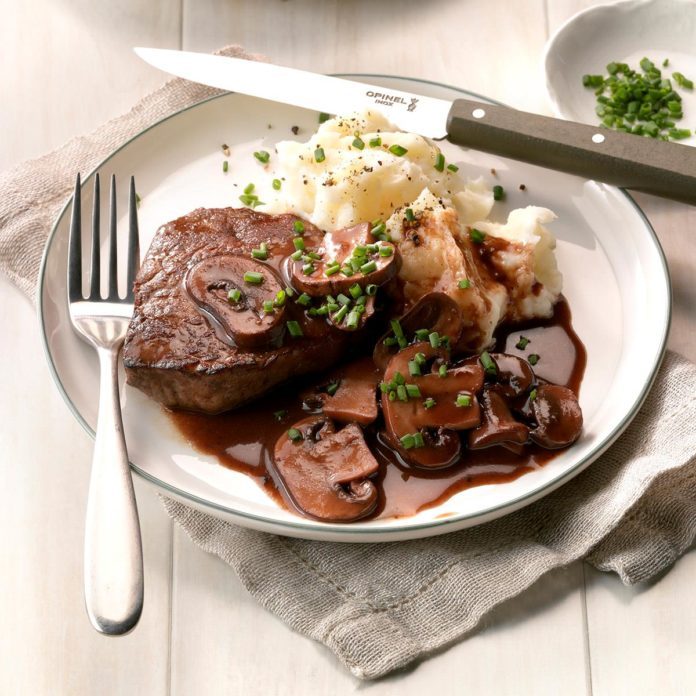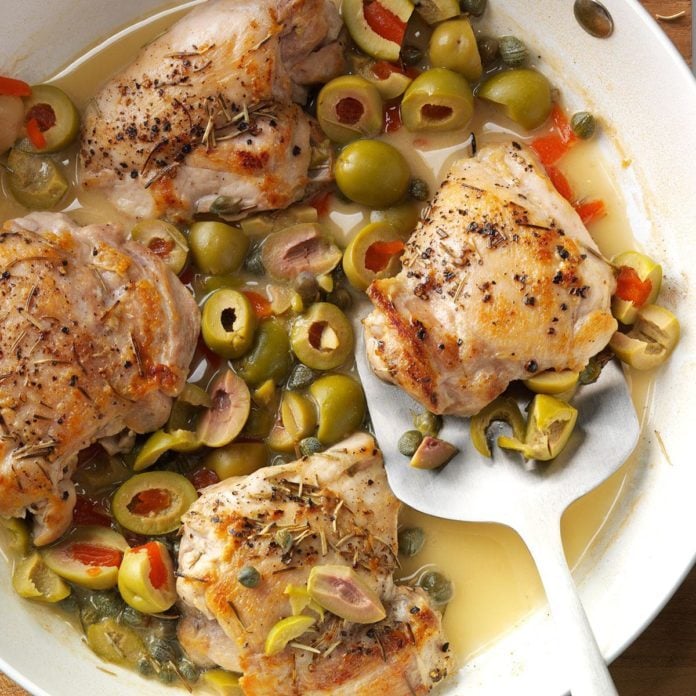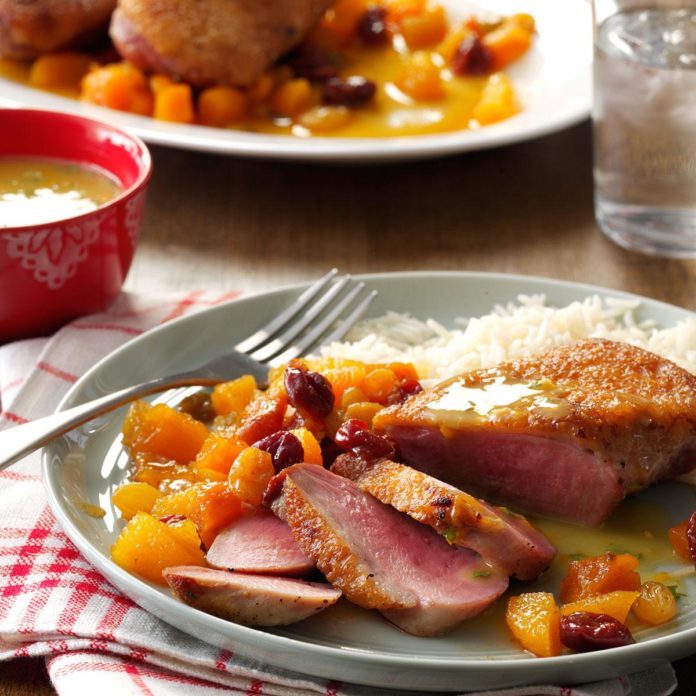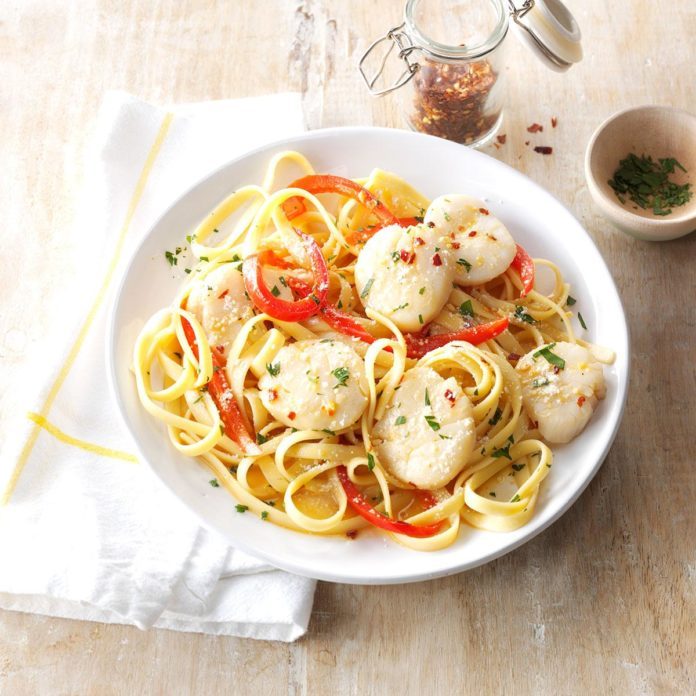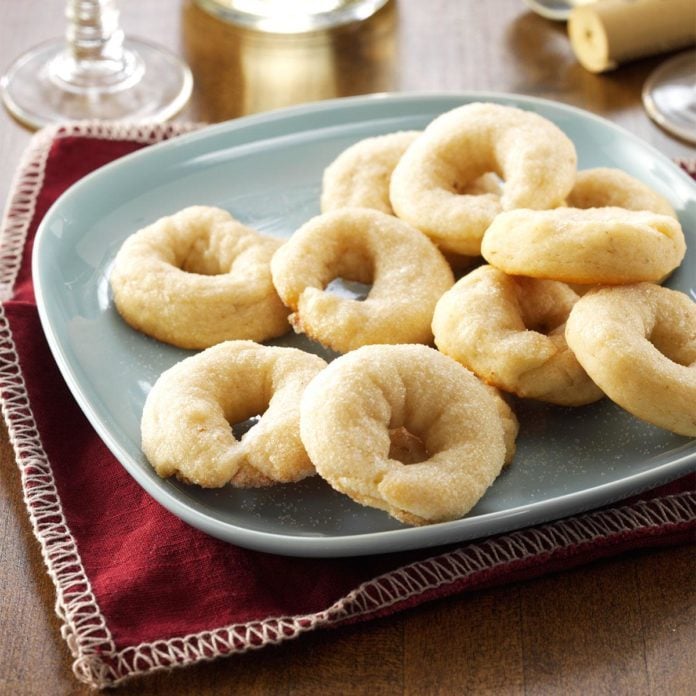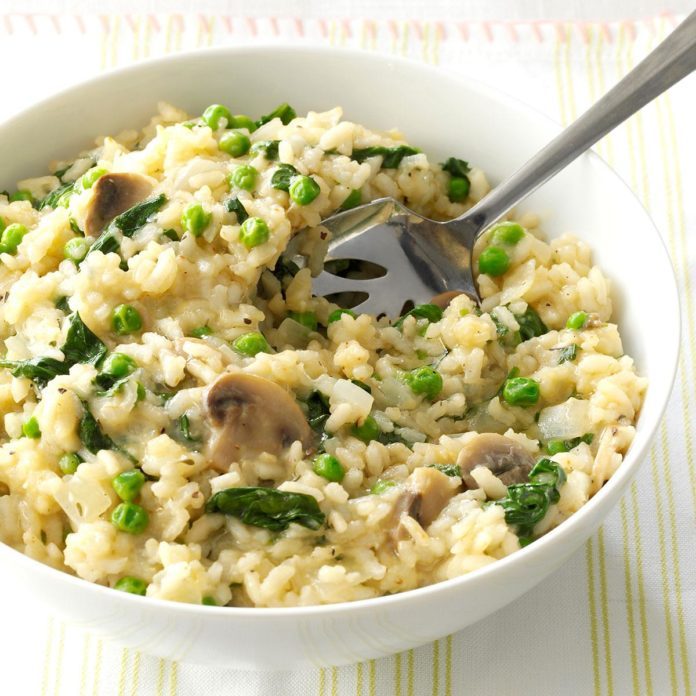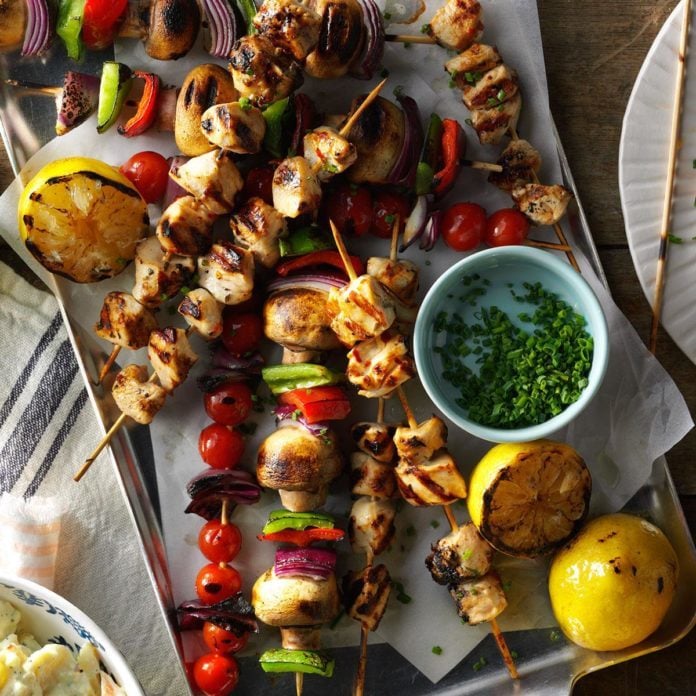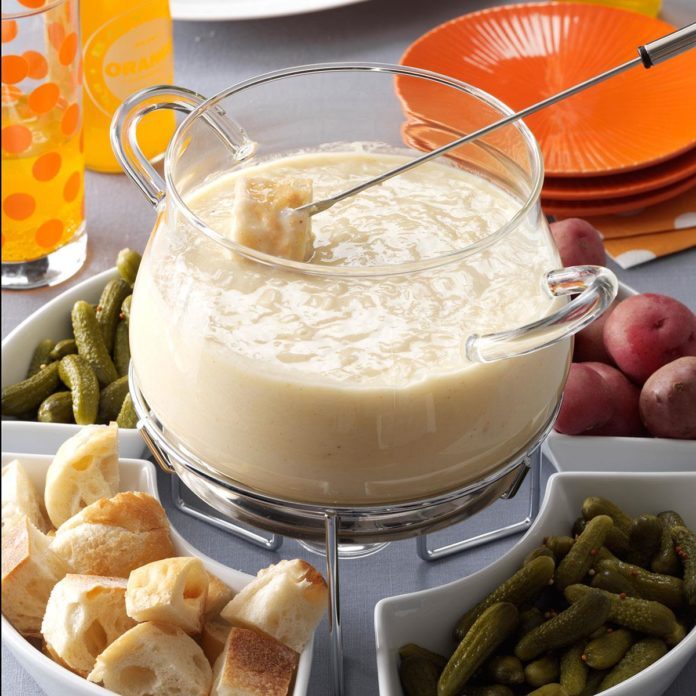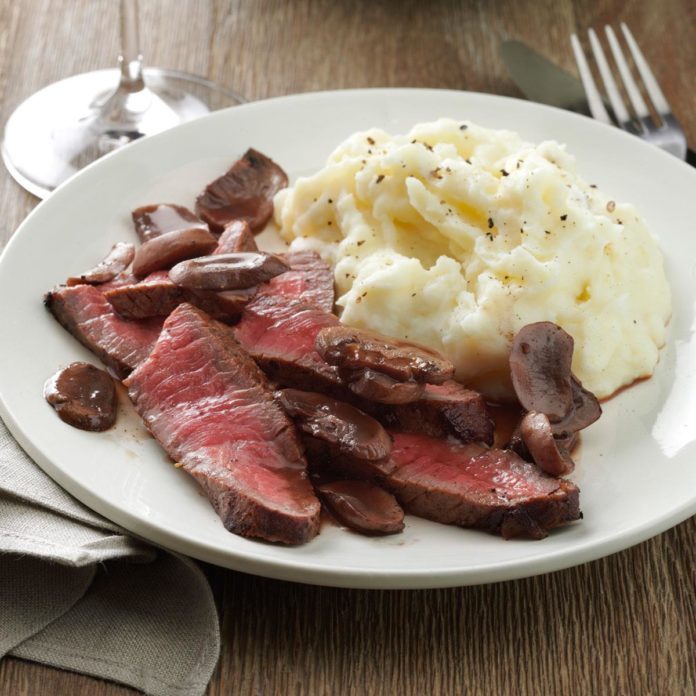I throw together these bold ingredients for a feisty seafood pasta. —Lynda Balslev, Sausalito, California
Get Recipe
I've liked the chicken and artichoke combo for a long time. Here's my own lemony twist. With all the praise it gets, this dinner is so much fun to serve. —Carly Giles, Hoquiam, Washington
Get Recipe
These warm spiced pears elevate slow cooking to a new level of elegance, yet they're incredibly easy to make. Your friends won't believe this fancy-looking dessert came from a slow cooker. —Elizabeth Hanes, Peralta, New Mexico
Get Recipe
Treat holiday guests to elegant comfort food at its best. Our osso bucco beef boasts a thick, savory sauce complemented by the addition of gremolata, a chopped herb condiment made of lemon zest, garlic, and parsley. —Taste of Home Test Kitchen, Greendale, Wisconsin
Get Recipe
Risotto is a creamy Italian rice dish. In this version from our Test Kitchen, the rice is briefly sauteed, then slowly cooked in wine and seasonings.
Get Recipe
A red wine sauce complements the brown sugar rub on the roast in this inviting entree. You can't go wrong with this down-home dish!—Taste of Home Test Kitchen
Get Recipe
Once you've tried this tangy, yet delicate chicken piccata, you won't hesitate to make it for company. Seasoned with parmesan and parsley, the chicken cooks up golden brown, then is drizzled with a light lemon sauce. —Susan Pursell, Fountain Valley, California
Get Recipe
These tasty steaks seem special but they are fast enough for everyday dinners. We enjoy the mushroom-topped fillets with crusty French bread, mixed salad and a light lemon dessert. —Christel Stein, Tampa, Florida
Get Recipe
This easy beef stew is incredibly rich. Since it's even better a day or two later, you may want to make a double batch. —Michaela Rosenthal, Woodland Hills, California
Get Recipe
My mother-in-law has a sour cherry tree in her yard that yields many quarts of cherries each June, and this is a great way to use some up. This frosty sweet-sour sorbet is a refreshing treat on a hot summer day. —Carol Gaus, Itasca, Illinois
Get Recipe
Pot roast recipes are the ultimate comfort food. When juicy pot roast simmers in garlic, onions and veggies, everyone comes running to ask, "When can we eat?" The answer? Just wait—it will be worth it. —Taste of Home Test Kitchen
Get Recipe
I had a bunch of fresh veggies and combined them with sausage, gnocchi and goat cheese when I needed a quick dinner. Mix and match your own ingredients for unique results. —Dahlia Abrams, Detroit, Michigan
Get Recipe
When my whole family comes over for dinner, I make a big platter of roast chicken with sweet potatoes, carrots and fennel. My dad leads the fan club. —Kelly Ferguson, Conshohocken, Pennsylvania
Get Recipe
My mother-in-law gave me this recipe years ago, and I have used it ever since. My family loves the sweetness with a little kick.—Hilary Rigo, Wickenburg, Arizona
Get Recipe
While I was visiting my cousin Lilliana in Italy, she made this heavenly chicken for lunch. Now it's a family favorite stateside, too. —Rosemarie Pisano, Revere, Massachusetts
Get Recipe
End the meal with a flourish with this easy and elegant dessert. A hint of orange lends just enough sweetness to temper the wine's bold taste. —Julianne Schnuck, Milwaukee, Wisconsin
Get Recipe
Every forkful of this spectacular salad has a crunch from walnuts, a burst of flavor from pomegranate seeds and a smooth finish from the simple vinaigrette. —Ray Uyeda, Mountain View, California
Get Recipe
Most people don't think about grapes when creating a canned pickle recipe. The pickling liquid for these grapes includes red wine, vinegar, and common pickling spices like coriander, mustard seeds and hot pepper; it also contains warm spices like cinnamon and star anise along with brown sugar. These flavor-packed grapes are unique and delicious on an antipasto, pickle or cheese tray. —Cheryl Perry, Hertford, North Carolina
Get Recipe
Chicken and dumplings harken back to my childhood and chilly days when we devoured those cute little balls of dough swimming in hot, rich broth. —Erika Monroe-Williams, Scottsdale, Arizona
Get Recipe
When serving this entree as part of a buffet, try using chafing dish to keep it warm. —Taste of Home Test Kitchen
Get Recipe
This moist and tender chicken comes complete with its own creamy spinach side dish! It makes a pretty presentation and comes together in no time flat for a nutritious weeknight meal. —Genna Johannes, Wrightstown, Wisconsin
Get Recipe
This luscious and lemony pasta dish is so easy, it's become one of our weekly meal mainstays. But it's also elegant enough to serve to guests. —Donna Thompson, Laramie, Wyoming
Get Recipe
Here's my reproduction of a dish from a famous Chicago eatery. We think it rivals the original. I usually cook this at least once a week. It's a tasty way to keep my lunchbox full of healthy options. —Marilyn McGinnis, Peoria, Arizona
Get Recipe
My grandmother did not speak English very well, but she knew the language of great food. These wine cookies are crisp and best eaten after being dunked in even more wine.—Julia Meyers, Scottsdale, Arizona
Get Recipe
Once a week, I create a new recipe for my blog, An Officer and a Vegan. I first made this risotto when I needed something cheerful and comforting. It would be fantastic with asparagus, zucchini or summer squash, but use whatever veggies are in season. —Deanna McDonald, Grand Rapids, Michigan
Get Recipe
When I see Meyer lemons in the store, it must be spring. I like using them for these easy chicken kabobs, but regular grilled lemons still add the signature smoky tang. —Terri Crandall, Gardnerville, Nevada
Get Recipe
This garlic chicken is great over cooked brown rice or your favorite pasta. Don't forget a sprinkle of Parmesan cheese, too. —Heather Esposito, Rome, New York
Get Recipe
This is a family favorite handed down from my grandmother in London. She made it for every family gathering. It was always the first food to go on the table and the first one to disappear. —Wayne Barnes, Montgomery, Alabama
Get Recipe
My husband and I own and operate a busy farm. There are days when there's just no time left for cooking! It's really nice to be able to come into the house at night and smell this wonderful slow cooker chicken cacciatore. —Aggie Arnold-Norman, Liberty, Pennsylvania
Get Recipe
Chili sauce, garlic and basil add flavor to these moist chicken thighs. We enjoy the tender grilled chicken not just in summertime, but throughout the year. —Marilyn Waltz, Idyllwild, California
Get Recipe
My creamy chicken tastes like a five-star restaurant dish but takes only minutes and few ingredients to make. Use fresh rosemary. Trust me. —Sarah Campbell, Terre Haute, IN
Get Recipe
Cozumel, Mexico, is home to magnificent Veracruz-style red snapper. You can't bring it home, so create your own. Try parchment paper instead of the foil packet. —Barb Miller, Oakdale, Minnesota
Get Recipe
Some of the many reasons I love this dessert recipe are: it's on the healthy side; it's easy to make; the recipe can be mostly prepared in advance of company arriving; and the presentation is lovely.—Jill Mant, Denver, Colorado
Get Recipe
Every spring, my family heads out to our timber acreage to collect morel mushrooms, and then we cook up this stew. We use morels, of course, but baby portobellos or button mushrooms or will work, too. —Amy Wertheim, Atlanta, Illinois
Get Recipe
I got this easy recipe from my daughter, who lives in France. It’s become my go-to fondue, and I make it often for our family.—Betty A. Mangas, Toledo, Ohio
Get Recipe
My mom dehydrates the last pick of tomatoes from her garden each fall—perfect for quick soups like this one. When I have time to prepare dried beans, I do—but don't worry if you don't. Canned beans are just as good. —Lori Terry, Chicago, Illinois
Get Recipe
Make this refreshing summer treat when melons are ripe and flavorful. I like to garnish each serving with a sprig of mint or a small slice of honeydew. —Bonnie Hawkins, Elkhorn, Wisconsin
Get Recipe
A mouthwatering combination of rich brown mushroom sauce and tender strips of peppery steak is a wonderful way to end a busy day. It’s special enough to make for company and ready in less than 30 minutes. —Joe Elliott, West Bend, WI
Get Recipe
This pizza-style recipe came from my friend Ruby's mom, who is a crazy-good cook. I added my own flair and tweaked it by using flour tortillas instead of making a dough. —Tamar Yacoubian, Ketchum, Idaho
Get Recipe
In Maryland, we stayed at a hotel that sent guests home with a crab dip recipe and a spice pouch. Now I’ve made my own dip that rekindles memories of that trip. —Kristina Wenner, Jamison, Pennsylvania
Get Recipe
I like to make this for weeknight dinners. You can make this roast chicken with apricot glaze or quince jelly. —Victoria Miller, San Ramon, California
Get Recipe
White wine adds delightful flavor to this hearty vegetarian entree. No one will miss the meat! —Bonnie Jost, Manitowoc, Wisconsin
Get Recipe
We were feeling festive when we started our holiday cooking, but a bottle of wine was a bit more than we wanted to drink. I added half a cup to the cranberry sauce, in place of juice, and a new recipe was born! —Helen Nelander, Boulder Creek, California
Get Recipe
Tossing the cooked potatoes with stock and wine right after you drain them infuses them with flavor. The liquid absorbs like magic. —George Levinthal, Goleta, California
Get Recipe [skyword_tracking]







